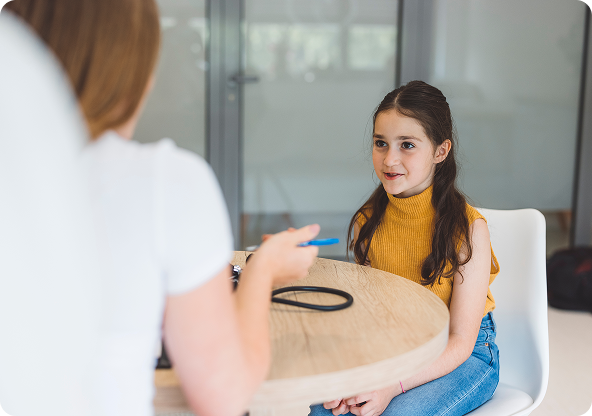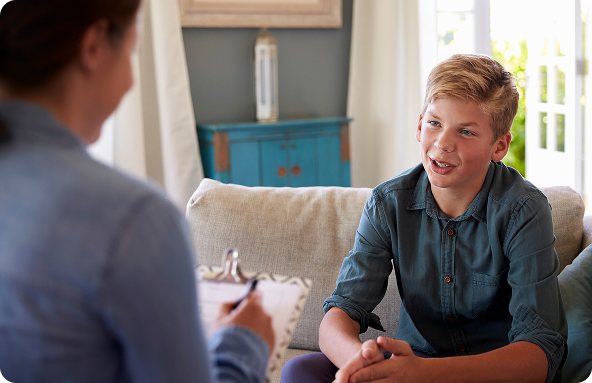RO DBT for Children and Adolescents at Metro NY DBT Center

Radically Open Dialectical Behavior Therapy for Youth
At Metro NY DBT Center, we recognize that many children and adolescents suffer with overcontrol tendencies—where perfectionism, emotional restraint, and inflexible thinking prevent genuine connection despite outward achievements. Our Radically Open Dialectical Behavior Therapy (RO-DBT) program for children and adolescents provides an evidence-based approach for addressing these patterns, helping young people develop greater flexibility, emotional expression, and social connection.
Our adolescent RO-DBT program helps young people:
Recognize patterns of overcontrol that may be causing social isolation
Increase psychological flexibility when faced with uncertainty
Develop skills for emotional expression in healthy and appropriate ways
Enhance social connectedness with peers and family members
Balance achievement orientation with personal wellbeing
Who Adolescent RO-DBT Might Be Beneficial For
Our RO DBT program for adolescents may be beneficial for clients who are experiencing:

Emotional and Social Patterns
• Difficulty expressing emotions or appearing emotionally "flat"
• Perfectionism and setting extremely high personal standards
• Rigid adherence to rules and difficulty with change
• Feelings of loneliness despite achievements
• Appearing aloof or distant in relationships
Behavioral Tendencies
• Excessive planning and caution in decision making
• Hyper-detailed focus that interferes with seeing the bigger picture
• Difficulty with spontaneity and playfulness
• Strong need for structure and control
• Challenges forming close friendships despite social skills


Related Conditions
• Chronic anxiety or depression that hasn't responded to typical treatments
• Obsessive-compulsive tendencies
• Perfectionistic traits that impact daily functioning
• Social difficulties that seem related to rigidity rather than skill deficits
Building Openness & Connection: The Core of RO-DBT
Our program provides a warm and structured environment where children and adolescents can learn to embrace flexibility, spontaneity, and genuine connection. We focus on five key areas to foster lasting emotional well-being:
The Metro NY DBT Difference
Choosing a therapist for the child in your life is a significant decision. At Metro NY DBT Center, we provide dedicated, expert, and compassionate RO-DBT care, specifically designed to meet the unique challenges of overcontrol in children and adolescents.
Advanced Expertise in RO-DBT
Our clinicians have completed intensive training in Radically Open DBT. We are committed to delivering this cutting-edge treatment with fidelity and skill, ensuring your child or adolescent receives the highest quality, evidence-based care from therapists who are leaders in this specific modality.
Developmentally-Tailored for Children & Teens
RO-DBT for youth is not simply a scaled-down version of the adult model. We use a developmentally-focused approach, adapting all interventions, language, and examples to be engaging and effective for the unique cognitive and emotional worlds of children and adolescents.
An Integrated, Family-Centered Framework
We believe that lasting change is best supported by the family system. Our comprehensive framework integrates individual therapy for your child, dedicated skills training classes, and active family involvement. This ensures that new skills are understood, reinforced, and practiced effectively at home, strengthening family relationships in the process.
Collaboration of Care
As a comprehensive mental health center, we offer seamless collaboration of care. Should your child’s needs evolve, we can provide a smooth collaboration to other specialized youth services, ensuring they always have access to effective support from a team they already know and trust.
Our Approach to RO-DBT at Metro NY DBT Center
Comprehensive Assessment & Pretreatment Phase
- Intake: Separate sessions for the child or adolescent and parents to assess history and goals (CPT Codes: 90791, 90834).
- Treatment Recommendation: A joint session to review findings and create a collaborative treatment plan (CPT Code: 90834).
- Pretreatment: Includes 4 individual sessions each for the teen and parents to build rapport, orient to RO-DBT, and establish commitment (CPT Code: 90834).
Stage 1 DBT Treatment (Approximately 30 weeks):
- Weekly Individual Therapy: A 45-minute session for the adolescent (CPT: 90834).
- Weekly Multi-Family Skills Group: A 75-minute session for the child or adolescent and caregivers to practice DBT skills (CPT: 90849).
- Parenting Sessions: As-needed 45-minute sessions for caregiver support (CPT: 90846).
- Integrated Phone Coaching: As described in the core components.
Commitment to All Modes of Therapy
Success in RO-DBT relies on consistent participation in all components: Individual therapy, Multi-Family Skills Group, Parent Sessions, and Phone Coaching.
Hybrid Model of Delivery
At this time, individual sessions can often be held either virtually or in-person, as decided with the individual therapist. Most of our groups are currently offered virtually.
The Metro NY DBT Difference: RO-DBT for Children & Adolescents
Choosing Metro NY DBT Center for Radically Open DBT (RO-DBT) means working with a team dedicated to expert, compassionate care for the unique challenges of overcontrol.
Expertise in Radically Open DBT
Our clinicians have completed intensive training in RO-DBT, understanding its specific application for helping youth move beyond perfectionism and rigidity toward genuine connection.
Strong Family-Centered Collaboration
We believe in the power of family involvement and work closely with children, adolescents and their caregivers as active partners, teaching skills that strengthen family-wide flexibility and emotional expression.
Focus on Real-World Skills for Lasting Connection
RO-DBT equips teens and families with practical, actionable strategies to enhance social signaling, embrace feedback, and build the meaningful relationships they desire beyond the therapy room.
An Evidence-Based Path to Openness and Flexibility
In a world that often rewards perfectionism, we provide a supportive and structured environment where overcontrolled youth can find relief and develop lasting psychological flexibility and authentic social bonds.

Consult With Us
If your child struggles with overcontrol, perfectionism, or difficulty connecting with others, our specialized RO-DBT program may provide the path forward they need. Contact us to learn more about how this innovative approach can help your child. Schedule your consultation today.
Connect with our team:
Visit our Contact Page: Click Here
Frequently Asked Questions About RO-DBT for Youth
How is RO-DBT different from standard DBT for children?
While traditional Dialectical Behavior Therapy (DBT) helps young people who struggle with emotional dysregulation and impulse control, RO-DBT addresses different challenges—excessive self-control and emotional inhibition. Standard DBT focuses on building skills for emotion undercontrol, while RO-DBT helps youth develop greater flexibility, emotional expression, and social connectedness.
What issues does RO-DBT address in children and teens?
RO-DBT for children and teens addresses issues related to overcontrol, including perfectionism, emotional restraint, rigid thinking, and difficulty forming genuine social connections. It helps young people who may appear outwardly successful but struggle with internal emotional inhibition and social isolation.
Is my child a good candidate for RO-DBT?
RO-DBT may be appropriate for youth who are perfectionistic, rigid in their thinking, have difficulty expressing emotions, or struggle to form close relationships despite having good social skills. Our assessment process helps determine if this approach is the right fit for your child's specific needs. Other services might be more appropiate so feel free to explore our DBT and CBT pages.
What role do parents play in RO-DBT treatment?
Parents and caregivers play an important role in supporting their child's RO-DBT treatment. We provide guidance to help family members understand overcontrol patterns and learn ways to encourage flexibility and emotional expression at home. Family involvement helps reinforce the skills learned in therapy.
Is this program offered virtually or in person?
Our RO-DBT program for adolescents is offered through a hybrid model.
How long is the RO DBT program for adolescents?
The initial Stage 1 of our RO-DBT program for adolescents typically lasts approximately 30 weeks. This includes weekly individual therapy sessions, weekly multi-family skills group sessions, and ongoing parenting sessions as needed.
